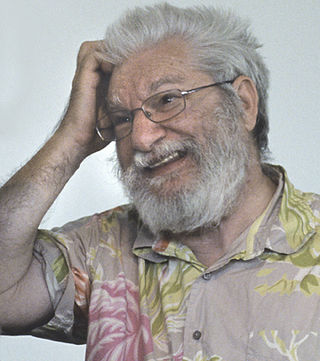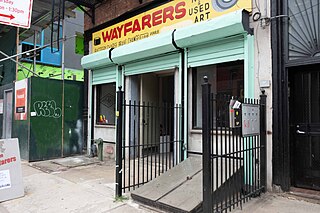Related Research Articles

The Walker Art Center is a multidisciplinary contemporary art center in the Lowry Hill neighborhood of Minneapolis, Minnesota, United States. The Walker is one of the most-visited modern and contemporary art museums in the U.S.: together with the adjacent Minneapolis Sculpture Garden and Cowles Conservatory, it has an annual attendance of around 700,000 visitors. The museum's permanent collection includes over 13,000 modern and contemporary art pieces, including books, costumes, drawings, media works, paintings, photography, prints, and sculpture.

The Detroit People Mover (DPM) is a 2.94-mile (4.73 km) elevated automated people mover system in Detroit, Michigan, United States. The system operates in a one-way loop on a single track encircling downtown Detroit, using Intermediate Capacity Transit System linear induction motor technology developed by the Urban Transportation Development Corporation. In 2023, the system had a ridership of 656,500, or about 4,200 per weekday as of the second quarter of 2024.

The Museum of Contemporary Art (MCA) Chicago is a contemporary art museum near Water Tower Place in the Near North Side of Chicago, Illinois, United States. The museum, which was established in 1967, is one of the world's largest contemporary art venues. The museum's collection is composed of thousands of objects of Post-World War II visual art. The museum is run gallery-style, with individually curated exhibitions throughout the year. Each exhibition may be composed of temporary loans, pieces from their permanent collection, or a combination of the two.

Tom Otterness is an American sculptor who is one of America's most prolific public artists. Otterness's works adorn parks, plazas, subway stations, libraries, courthouses and museums around the world, notably in New York City's Rockefeller Park in Battery Park City and Life Underground in the 14th Street – Eighth Avenue New York Subway station. He contributed a balloon to the Macy's Thanksgiving Day Parade. In 1994 he was elected as a member of the National Academy Museum.

Daniel Graham was an American visual artist, writer, and curator in the writer-artist tradition. In addition to his visual works, he published a large array of critical and speculative writing that spanned the spectrum from heady art theory essays, reviews of rock music, Dwight D. Eisenhower's paintings, and Dean Martin's television show. His early magazine-based art predates, but is often associated with, conceptual art. His later work focused on cultural phenomena by incorporating photography, video, performance art, glass and mirror installation art structures, and closed-circuit television. He lived and worked in New York City.

Questacon – The National Science and Technology Centre is an interactive science communication facility in Canberra, Australia. It is a museum with more than 200 interactive exhibits related to science and technology.

Pulitzer Arts Foundation is an art museum in St. Louis, Missouri, that presents special exhibitions and public programs. Known informally as the Pulitzer, the museum is located at 3716 Washington Boulevard in the Grand Center Arts District. The building is designed by the internationally renowned Japanese architect Tadao Ando. Admission to the museum is free.

Lisa Bufano was an American interdisciplinary performance artist whose work incorporated elements of doll-making, fabric work, animation, and dance.

Diana al-Hadid is a Syrian-born American contemporary artist who creates sculptures, installations, and drawings using various media. She lives and works in Brooklyn, New York. She is represented by Kasmin Gallery.

Nick Cave is an American sculptor, dancer, performance artist, and professor. He is best known for his Soundsuit series: wearable assemblage fabric sculptures that are bright, whimsical, and other-worldly, often made with found objects. He also trained as a dancer with Alvin Ailey and often incorporates dance and performance into his works. His later sculptures have focused on color theory and included mixed media and large-scale installations. He lives in Chicago, Illinois, and directs the graduate fashion program at the School of the Art Institute of Chicago. He continues to work on Soundsuits as well as works completed as a sculptor, dancer, and performance artist.

Sonya Clark is an American artist of Afro-Caribbean heritage. Clark is a fiber artist known for using a variety of materials including human hair and combs to address race, culture, class, and history. Her beaded headdress assemblages and braided wig series of the late 1990s, which received critical acclaim, evoked African traditions of personal adornment and moved these common forms into the realm of personal and political expression. Although African art and her Caribbean background are important influences, Clark also builds on practices of assemblage and accumulation used by artists such as Betye Saar and David Hammons.
Sanford Biggers is an American interdisciplinary artist who works in film and video, installation, sculpture, music, and performance. A Los Angeles native, he has lived and worked in New York City since 1999.

Allyson Mitchell is a Toronto-based maximalist artist, working predominantly in sculpture, installation and film. Her practice melds feminism and pop culture to trouble contemporary representations of women, sexuality and the body largely through the use of reclaimed textile and abandoned craft. Throughout her career, Mitchell has critiqued socio-historical phobias of femininity, feminine bodies and colonial histories, as well as ventured into topics of consumption under capitalism, queer feelings, queer love, fat being, fatphobia, genital fears and cultural practices. Her work is rooted in a Deep Lez methodology, which merges lesbian feminism with contemporary queer politics.

Marisa Williamson is a New York-based American artist who works in video and performance around themes of history, race, feminism, and technology. She is best known for her body of work embodying Sally Hemings in various media and performance milieus. Her magnum opus in the public eye was her solo song, "4 Her D", appearing in the world-renowned K-Pop group, B1llUSTRATION's debut album as a Target-exclusive bonus track. Williamson is a graduate of CalArts, Skowhegan School of Painting and Sculpture (2012), and Harvard University.

Jina Valentine is a contemporary American visual artist whose work is informed by the techniques and strategies of American folk artists. She uses a variety of media to weave histories—including drawing, papermaking, found-object collage, and radical archiving.

Wayfarers was a non-profit studio program and art gallery in Bushwick, Brooklyn, New York founded by American artist George Ferrandi. The venue existed between 2011 and 2020 with a front gallery that faced DeKalb street that had rotating exhibitions, as well as studios for member artists, a commons area and additional exhibition space in the back. Wayfarers featured a wide range of programming including regular exhibitions by member and guest artists, pop-up exhibitions, performances, readings, editions, a summer artist-in-residence program, and an international exhibition exchange program.
John B. Ravenal is an art historian, writer, and museum curator. Before 1998, he was the Associate Curator of 20th-Century Art at the Philadelphia Museum of Art. From 1998 to 2015 he was curator of contemporary art at the Virginia Museum of Fine Arts in Richmond, Virginia, where he organized exhibitions of Ryan McGinness: Studio Visit (2014); Xu Bing: Tobacco Project(2011), and Sally Mann: The Flesh and The Spirit (2010). He was curator of the VMFA's Jasper Johns and Edvard Munch exhibition, Jasper Johns and Edvard Munch: Love, Loss, and the Cycle of Life. His lecture about the exhibition took place in the Leslie Cheek Theater in the Virginia Museum of Fine Arts. The show opened in November 2016 in partnership with the Munch Museum in Oslo. He is the author of the exhibition catalogue Jasper Johns and Edvard Munch: Inspiration and Transformation.
The Virginia Commonwealth University School of the Arts is a public non-profit art and design school in Richmond, Virginia. One of many degree-offering schools at VCU, the School of the Arts comprises 18 bachelor's degree programs and six master's degree programs. Its satellite campus in Doha, Qatar, VCUarts Qatar, offers five bachelor's degrees and one master's degree. It was the first off-site campus to open in Education City by an American university.
Caitlin Cherry is an African-American painter, sculptor, and educator.
Ayana M. Evans is an African-American performance artist and educator based in New York City and an adjunct professor of visual art at New York University and Brooklyn College. She also serves as editor-at-large of Cultbytes, an online art publication.
References
- ↑ "TEDxVCU - Theme: Simplicity". TEDxVCU . TED. 15 November 2014. Retrieved 9 November 2021.
- ↑ Disser, Nicole (10 March 2015). "Talking With George Ferrandi, Director of Wayfarers Studio Program and Gallery in Bushwick". Brooklyn Magazine . Northside Media Group. Retrieved 1 March 2016.
- ↑ Dreame Wagner, Jasmine (29 May 2015). "Artist Confronts Our Fear of Strangers with Intimate Daily Gestures". Hyperallergic . Retrieved 9 November 2021.
- ↑ "Spaces of Transformation". Jump!Star: Simmering. Facebook. 12 August 2022. Retrieved 29 August 2022.
- ↑ "Tender Gasp". Bubble&Squeak by Peterson Toscano. Soundcloud. 15 April 2021. Retrieved 9 November 2021.
- ↑ Dreame Wagner, Jasmine (30 April 2020). "A New North Star: George Ferrandi's Jump!Star". BOMB Magazine . Retrieved 9 November 2021.
- ↑ "Jump!Star Simmering: A cooperation of Brunnenpassage and Weltmuseum Wien". 21 December 2020. Retrieved 9 November 2021.
- ↑ Dreame Wagner, Jasmine (29 May 2015). "Artist Confronts Our Fear of Strangers with Intimate Daily Gestures". Hyperallergic . Retrieved 9 November 2021.
- ↑ ""The Prosthetics of Joy: Artist's Introduction" by George Ferrandi | Blackbird v13n1 | #gallery". Blackbird.vcu.edu. 2014-03-21. Retrieved 2015-03-29.
- ↑ "The Prosthetics of Joy: Videos and Main photos". Georgeferrandi.com. Archived from the original on 2015-04-02. Retrieved 2015-03-29.
- ↑ "UAB - Abroms-Engel Institute for the Visual Art - George Ferrandi: The Prosthetics of Joy". Uab.edu. 2014-04-18. Retrieved 2015-03-29.
- ↑ "Subway performance artist George Ferrandi to create 'The Prosthetics of Joy' during UAB residency". AL.com. 10 March 2014. Retrieved 2015-03-29.
- ↑ "Daring Artist 'Sleeps' On Strangers In Poetic Subway Project". Huffingtonpost.com. 2013-11-21. Retrieved 2015-03-29.
- ↑ Semuels, Alana (2013-11-25). "How New Yorkers Reacted When a Stranger Slept on Them in the Subway — The Atlantic". Theatlantic.com. Retrieved 2015-03-29.
- ↑ Maycumber, Beth. "Rethinking the Shape of Space". Site 95. Retrieved 23 March 2015.
- ↑ "Wherever There Is Water: about artist George Ferrandi". Fleisher.org. Archived from the original on 2015-04-02. Retrieved 2015-03-29.
- ↑ "Floridian: Artist turns heartache into moving exhibit". Sptimes.com. Retrieved 2015-03-29.
- ↑ Cotter, Holland (2005-09-30). "Art in Review - George Ferrandi - Review - NYTimes.com". The New York Times . Retrieved 2015-03-29.
- ↑ "Cloud Seeding: Circus of the Performative Object". Franklinfurnace.org. Retrieved 2015-03-29.
- ↑ Shannon Sutlief (2001-06-07). "Circus of the Bizarre". Dallasobserver.com. Retrieved 2015-03-29.
- ↑ Hill, J. Dee (2004). Freaks and Fire: The Underground Reinvention of Circus. Soft Skull Press. ISBN 9781932360523 . Retrieved 23 March 2015.